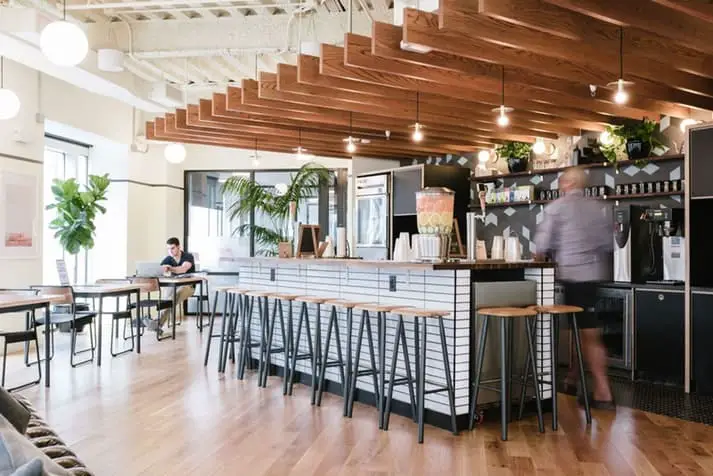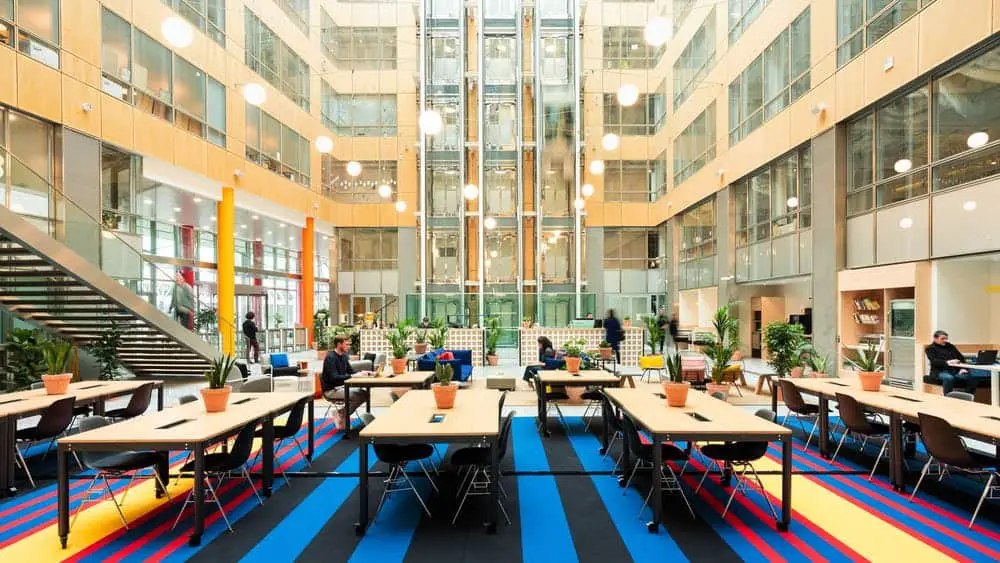The quest for a perfect workspace can be a tiring exercise. Investing in real estate might not work for every office. Rented workspaces come with their limitations too. WeWork and Regus are companies catering specifically to this conundrum.
So, which works better – WeWork or Regus?
· Regus is present in more locations than WeWork, although the latter is catching up fast.
· Regus has a more formal feel compared to WeWork, which makes it a haven for serious businesses.
· WeWork has more transparent pricing present on its website.
To understand WeWork or Regus in a more detailed manner, we first need to understand the basics of “coworking.”
A Detailed Insight into Coworking
What is coworking?
Coworking is the use of an office or workplace infrastructure by people who are self-employed, freelancers, or working for different employers, typically to share equipment, ideas, and knowledge.
is the use of an office or workplace infrastructure by people who are self-employed, freelancers, or working for different employers, typically to share equipment, ideas, and knowledge.
As per Wikipedia, coworking is “a social gathering of a group of people who are still working independently, but who share values and who are interested in the synergy that can happen from working with people who value working in the same place alongside each other.”
How did this industry come into force?
New realities give birth to new concepts, so therefore the origin of coworking spaces . With the face of industry changing rapidly over time, a lot of work has also been happening online with a global workforce. With the need and expense for similar technology, equipment, and rentals going through the roof, coworking has gained currency. It was conceptualized in 2005 by Brad Neuberg in San Francisco.
. With the face of industry changing rapidly over time, a lot of work has also been happening online with a global workforce. With the need and expense for similar technology, equipment, and rentals going through the roof, coworking has gained currency. It was conceptualized in 2005 by Brad Neuberg in San Francisco.
The coworking movement has since captured the imagination of industries worldwide. There are more and more coworking spaces popping up across the globe. These are spaces where technology, real estate and a global community come together to produce some of the finest work.
Coworking spaces are so much in demand that there are entire websites dedicated to the same. There is a whole world of coworking out there waiting to be explored. Perhaps this can explain to some extent the rage that this trend has become. Fuelled by increasing demand, functional and aesthetically appealing workspaces are coming up each day. Check out coworking cpaces listed on Open Sourced Workplace using this link .
.
Advantages of Coworking
As noted above, the idea of a coworking space is revolutionizing the way people think about work. It gives any worker or company a competitive edge that was unimaginable some time back. Everyone involved can stake out a big carving of the development and growth pie while enjoying all benefits that such a workspace brings. Some benefits bring:
· Sharing of infrastructure. Touted as one of the most attractive features of a coworking setup is the sharing of infrastructure. All that a person might need to work an online job is available under one roof without the hassle of having to run around to fix it oneself. From internet and cloud connectivity to air-conditioning and personal cubicles and much more, it is all set up and waiting for one to begin work.
· Community environment. Coworking means working together, in every sense of the word. You have people of all kinds around you, from different nationalities and belonging to different parts of the world, speaking different languages and of varied cultures, working closely in proximity to each other.
· Cost-cutting. Whenever resources are shared and there is pooling of ideas and infrastructure, there is bound to be cost-cutting. Instead of investing in real estate followed by setting up an office, you need to pay a monthly rental depending upon what kind of space is needed, and that basically is it.
· Flexible and dynamic environment. Millennials especially are in love with the concept of coworking because of the flexible and dynamic setup. A person who was sitting next to you one day might be completely different from another day. New faces and new experiences await one each day. This is quite a thrill for the new generation, although some of older experience might find the very flexibility a bit of a distraction.
· Different offices, one roof. Multi-various skilled people can be found working under one roof at a coworking setup. The range of different jobs can be quite mind-boggling. With jobs shifting online and people lapping them up eagerly, there are at times a profusion of different jobs going on in a shared working space. This is fascinating to watch and feed off.
· Networking. One of the vital advantages of working in a coworking setup is networking. One meets and interacts with so many different people on any given day, either from the same industry or different. As such, coworking spaces become platforms for superior networking opportunities. A dynamic atmosphere at a shared coworking space lends itself to fruitful interactions and can become a hotbed for fresh business ideas.
· Peer exposure. Not only do coworking spaces help in meeting people from other businesses but also peers from the same industry. This lends a big competitive edge and leaves much room for improvement. Peer presence can boost competition in a healthy manner that can lead one to greater growth.
· Work and fun. Work can be a lot of fun in a dynamic workspace, as in coworking. Different crowds, new faces, lively chatter, and a lot of millennials under the same roof create a situation ripe with potential. All work and lots of play becomes the new mantra for such workspaces, leading to a happy bunch of people who can have fun while being focused on their goals.
Who uses coworking spaces?
Many people would like to believe that it is only small companies or startups that prefer shared spaces. This is not true. A larger number of big companies are opting for coworking spaces. The same issues that smaller ventures face plague bigger companies, often at the cost of precious time and resources. Freelancers use them, SMEs and corporates too.
Different types of coworking spaces
Coworking spaces that are generalized to particular industries are getting more common. Say you are into the dance industry. You will find many dance studios with floors that work as shared spaces. There are legal workspaces, creative workspaces, women-specific workplaces, as well as those for global citizens.
Some terms and definitions particular to the coworking culture
As this industry has evolved, so have the different kinds of spaces as well as has a completely different terminology. A new language has formed to go with it.
Whenever a radical shift has happened in the way people work or look at work in the past, it has been accompanied by a host of new things. One of the standout aspects of a new work culture is always the new terminology associated with it. These new terms invariably grow from the nature of work and are typical to that particular system, as are the times in which they occur. However, the most important factor that influences and shapes new work culture language is the people who are doing the work.
This automatically means an entirely new set of terms and definitions for the coworking era that is chiefly peopled by millennials. Since it is so, in keeping with them and the modern times, it would be more apt to call this ‘lingo’ rather than the more formal and old-fashioned ‘language.’
Read on to learn the new terminology that coworking spaces have ushered in:
· Hot desking/flex desking. The most recognizable and defining term associated with coworking is hot desking or flex desking. This indicates how different workers over different times work at the same desk using the same infrastructure. This essentially lies at the heart of coworking.
or flex desking. This indicates how different workers over different times work at the same desk using the same infrastructure. This essentially lies at the heart of coworking.
· Dedicated desk. Coworking means shared spaces. In this environment, a personal space is called a dedicated desk. These come at a higher price and the same user is then able to use this space every day.
· Phone booths. A phone booth is a private space within the open coworking office plan that is created with the sole idea of making a phone call without disturbing others or getting disturbed oneself.
· Conference rooms. Goes by the name “meeting room” too. As the name suggests, this is a space within a coworking office space set aside exclusively for conferences and meetings. It has to be a relatively larger space since there are many people involved. It has all the equipment and technology needed to carry out a conference successfully.
· Accelerator. Helps accelerate growth of ideas that have been developed externally. They provide coaching, capital, workspace and networking services.
· Broker. Helps find the right match between businesses and coworking spaces worldwide. They work for a fee and act as a third-party agent.
· Community. The relationship between different parties of a coworking space is known as community. This is an environment that helps promote goodwill and good vibes.
· Community manager. Person in charge of ensuring a good community around the workspace. They also help organize events and welcome guests, and in general ensure everyone is happy in the workspace.
· Event space. Many coworking spaces offer a dedicated area for hosting events of various kinds. This is generally a profitable venture for the hosts when different offices within the workspace wish to hold events through the year.
· Incubator. As the name suggests, this is a space set aside for nurturing and developing internally ideated projects and help them towards successful completion.
· Jelly coworking. This signifies an informal meet of other workers at a mutually agreed space to work and have fun. These are free gatherings with Wi-Fi being the main requisite.
· Third space. When a worker is neither at home nor at a conventional office but is working from somewhere in between, say a coffee shop or business lounge with Wi-Fi access, this is called third space.
· Serviced office. Within the shared space of a coworking setting, a serviced office is one that provides privacy and many amenities that are alien to the general co-worker. These spaces come at a steep cost and can be hired from months to many years.

WeWork versus Regus, which is better?
As discussed in detail earlier, coworking spaces are the latest byword in the working world. And when there is a requirement, there are always ways and means to fulfil the same. More and more people come up with revolutionary ideas to fill in the spaces. This is what has happened in the coworking industry as well.
Two leading names in this field are WeWork and Regus. They have become automatic choices when looking for shared working spaces. Read on to find out who offers what advantages and how it will suit a particular office profile, or not.
All about WeWork
With real estate spread worldwide from New York to Tokyo and everywhere in between, WeWork offers coworking premises in over 500 locations across the globe. They offer a wide range of services in terms of shared workspaces. Customers can choose according to their needs at all times. WeWork offers customized offices to cater to specific requirements and businesses, ready offices that are flexible to accommodate many sizes, and classic coworking spaces.
offers coworking premises in over 500 locations across the globe. They offer a wide range of services in terms of shared workspaces. Customers can choose according to their needs at all times. WeWork offers customized offices to cater to specific requirements and businesses, ready offices that are flexible to accommodate many sizes, and classic coworking spaces.
WeWork offers spaces at some of the best locations worldwide. Not only are they to be found at most places, but also located at some of the prime rental areas. With their ready to go office spaces, companies have the upper hand in beginning business on the run. Employing WeWork for your scouting out of a new coworking space can provide you these benefits:
· Cut out real estate expenses. The most attractive and compelling reason for anyone to opt for WeWork coworking has to be because they can cut down on real estate expenses. Worldwide phenomena point at rising corporate rents and increased costs of maintaining offices. Buying an office space is a huge investment which might not bear fruit in the long run. Just in case the business fails to take off as expected, real estate investment can turn into a liability that gets difficult to dispose of when markets are in the red. A shared space takes care of such hassles.
· Keep expenses level. Owning an office space is one thing, maintaining it through thick and thin, is another altogether. Keeping up with maintenance of a large space as rentals and other factors go on the upswing can be very challenging at tough times.
· Reduce liabilities. As discussed earlier, renting office spaces is that much easier than having a huge amount of money locked as a liability. For a working office, everything has to be taken care of. From security to comfort to essentials in the form of hardware and office stationary, and everything in between, has to be accounted for. Renting a space at WeWork means the work gets done while not having finances caught up in the office.
· Up real estate adaptability. Depending upon the kind of job and its requirements, it is so much easier to adapt when in a rented space. One does not have to invest from one’s own resources. All of it is taken care of by WeWork. There is provision for flexible and adaptable spaces in these offices and they are built with the aim to cater to changed perspectives.
· Efficient use of space. The same amount of space in a shared office gives much better utilization than a single office can. This is because a shared workspace has this feature in-built into the design. Optimum and maximum utilization is the motto.
· In sync with GAAP/IFRS. Customers have termination options, flexibility for short term, WeWork passes, and lease/non-lease component separation. These are some of the most attractive features of choosing them for all shared workspace requirements.
· Inclusivity. WeWork has inclusivity at its heart. Irrespective of the kind of work or the person who sits next to anyone, they provide a complete cultural and corporate experience in terms of inclusivity. Anyone who has the will to work in a thriving environment with all advantages of infrastructure at their disposal while indulging in healthy networking and cultural exposure would enjoy this experience.

All about Regus
Regus is another major real estate shared workspace provider which is much in demand now. Workspace optimization and viable solutions are at the core of its business. They are spread over 3000 locations worldwide and growing. Providing fully serviced offices at these locations is its forte. Whatever one might need in an office space is taken care of by Regus locations.
· Inclusive pricing. One of the most attractive features of Regus is that of inclusive pricing. The package that you opt for will have everything built right into it with no hidden costs at any time. From ready furnished offices to loaded infrastructure, one is ready to go and begin at any given time. It is just a matter of choosing a space to suit one’s needs.
· Flexible spaces. Regus has the option of flexible workspaces . Whether one is looking for a smaller office space and later wishes to upscale operations, they have provisions to do so. Equipping a chosen workspace with flexible worthy infrastructure, this company has chosen to provide its users with every kind of requirement, from small workspaces to large gatherings and conferences.
. Whether one is looking for a smaller office space and later wishes to upscale operations, they have provisions to do so. Equipping a chosen workspace with flexible worthy infrastructure, this company has chosen to provide its users with every kind of requirement, from small workspaces to large gatherings and conferences.
· Temporary offices. Not always do people look for a permanent office space. Many people who are working on particular projects that require a formal space equipped with all office utilities look for temporary spaces to hire. Regus offers such solutions without binding people into long-term commitments.
· Short notices. What sets Regus apart is that they work with short notices. This is in conjunction with their policy of being available for temporary offices of any kind. Being bound by 3-month notice periods as is the norm in many places can become a burden. This might not work particularly well with small setups that are working within tight monetary constraints. The choice of short notice periods is a great plus for them. As such spaces are very much in demand, there is no apprehension on part of the leasing company of desks going empty at any point in time.
· Workspaces catering to all uses. All and any kind of business that requires a rented space can find one here. Regus promises spaces for all kinds of users, be they freelancers, single users or part of a large organization. Anybody is welcome to register for them and get started on their work.
· Desks to entire offices on rent. Flexibility, thy name is Regus. Taking flexibility to the extreme, they provide anything from a single desk to an entire floor on rent. There really is no cap on how small a unit or how big an office space one needs to have in mind in order to get space with them.
A comparative look at WeWork and Regus
Businesses are set up with the sole aim of driving profitability and ensuring smooth flow of work. While many businesses prefer a conventional office space, many others are moving forward with a millennial mindset into coworking spaces.
Here is a comparative look at WeWork and Regus in terms of services provided in this regard, and the features and pros and cons of each of them:
|
Feature |
WeWork |
Regus |
|
Space |
They provide hot desks, dedicated desks, single desks, double desks, and multi-person offices. Their workspaces are generally glass and there is nothing whatsoever in terms of privacy if one is looking for same. |
They have hot desks, dedicated desks, single desks and multiple-person desks. Beautifully done up offices greet users. |
|
Pricing |
Spaces seem higher priced as compared to similar ones at Regus except for single desk spaces. |
Spaces are lower priced compared to WeWork. However, their single desk spaces are pricey but they do offer much more space. |
|
People |
Mostly populated by millennials, WeWork has a very casual vibe to it, which is how it would suit most people today. However, for those who are a bit conservative, it might be a factor to be aware of. |
A mixed profile of people work at Regus, which means one finds millennials as well as established business people sharing space. |
|
Looks |
As reported by various users, WeWork office spaces are more functional than they are pleasing to the eye in most cases. |
Regus has beautiful office spaces that are a treat for the eye. While they can be seen as being a bit off on modernity, their office spaces have great visual appeal. |
|
Membership |
WeWork memberships cost $45 per month. Depending upon location and requirement, prices can go up to $600 per month. |
Regus memberships begin at $99 per month onwards and customers have unlimited business lounge access. |
The coworking industry is a thriving new business now. Market realities are such that people are increasingly leaning towards this mode of shared spaces. There are as many different perspectives as there are people. Being market leaders in the coworking space provider industry, WeWork and Regus invite more scrutiny and beg comparison. There is always a question as to which one is better.
As listed above, there is a comparative table on defining features of each and how they fare in these segments. Pricing, location, looks and space are some of the most important factors when choosing coworking space. This is because generally they come equipped with superior infrastructure that does not bear comparison.
The general market sentiment is that WeWork is able to provide more attractive pricing to its hirers and users. The feeling is that they hire less priced real estate and then work on them to bring them up to standard. This is their strategy. Regus on the other hand has higher real estate commitments since it begins by acquiring spaces that are deemed best in the market.
Potential users have a wide choice ahead of them. Depending upon what kind of working atmosphere they most revel in, they can choose either of them. One thing is for sure, neither WeWork nor Regus can afford to provide an unsatisfactory work experience to its users. There is a lot at stake here.
WeWork and Regus are in fierce competition to grab the major chunk of coworking space pie. As business flourishes and this model of work seems the order of the day, they are going all out to expand and bring the best to workers. Not only amongst themselves, they have a lot of competition from other similar companies too.

Who are the other competitors in workspace sharing?
Coworking spaces are the new buzzword in business in the modern setting. With any upcoming trend that catches on, there are bound to be many players in the fray. WeWork and Regus are two of the leading players in this industry. They have spread themselves over hundreds of locations globally. Giving them tough competition are many other companies who have made their name known in this regard:
are the new buzzword in business in the modern setting. With any upcoming trend that catches on, there are bound to be many players in the fray. WeWork and Regus are two of the leading players in this industry. They have spread themselves over hundreds of locations globally. Giving them tough competition are many other companies who have made their name known in this regard:
· Impact Hub.
· Your Alley.
· Knotel.
· District Cowork.
· Techspace.
· Serendipity Labs.
· SomeCentral.
· Spaces.
· Make Office.
· Industrious Office.
· Green Desk.
Each new coworking company is bringing in new features and competitive pricing that is helping them register great success. With new challenges come new innovations that become a benchmark for competitors to learn from. From providing customized boutique spaces to providing customized services, new companies are evolving each day to accommodate new needs and requirements.
What is interesting is that this trend has not only spawned global competition but also helped many new companies make a name for themselves within a country. For example, in a young country like India with a large population of educated youngsters, the very idea of coworking has been lapped up. A lot of local entrepreneurs have come up with space sharing models along the lines of those mentioned above but tailored to suit local conditions and realities. It is a win-win situation for all concerned.
As the nature of jobs undergoes a revolution, these concepts are bound to thrive in the coming years. This is an area that is projected to witness vertical growth in future as spaces for working, networking and business growth. Anyone interested in the future of work definitely needs to give workspace sharing serious thought.
Freelancers and coworking
For a number of remote workers who choose to work from home, either regularly or freelancing, the monotony gets to them. Confined to their home looking at the same walls, doing chores, balancing duties, managing kids, and working away alone the whole day, can be very daunting. Even with taking breaks and trying out new things, the boredom and sameness can get to the best people.
Even a few years back, such workers from home had no option but to slog away. They had to find ways and means to beat boredom and still manage to remain active and productive. The concept of coworking spaces has been a boon for such people. Not only is there flexibility and ready to use office at their disposal, they also have the pleasure of interacting with a large crowd of similar minded people in a dynamic workspace.
Getting their home set up with the required infrastructure, however commonplace it might be is no longer their responsibility. Hiring a desk is all that it takes. No wonder this trend is catching on like wildfire among the new generation.
The advantage of a coworking space for a hitherto home worker is to be able to go out of the home while at the same time not having to abide by the rigidity of a conventional office. What they might have begun with, possibly sharing home space with another friend or acquaintance, has now taken shape of a coworking space that works for everyone.
Surveys reflect the popularity of this trend with traditional home workers and the impact it has had in shaping the industry. Coworking is here to stay. It is up to the individual to go ahead and make an educated choice on specific space providers.
Related questions
Is coworking possible from home?
The germ of the coworking idea might have begun from someone who shared workspace at home to optimize resources. The monotony of working alone is relieved to a large extent by having someone alongside. Sharing costs and resources while increasing productivity, is at the heart of space sharing.
What is the future of a global workforce?
Different people from across the globe interacting regularly can only give rise to positive changes in the workspace. New thoughts and constant exchange of ideas that happen at such places give rise to innovations and maximum utilization of technology for a better tomorrow.
Check out other topics:
– Technology ,
,
– Stress ,
,
– Wellness ,
,
– Workplace ,
,
– Productivity ,
,
– Hot Desking ,
,


